

Our Courses

AI for Medical Prognosis
AI is transforming the practice of medicine. It’s helping doctors diagnose patients more accurately, make predictions about patients’ future health, and recommend better treatments. This Specialization will give you practical experience in applying machine learning to concrete problems in medicine. Machine learning is a powerful tool for prognosis, a branch of medicine that specializes in predicting the future health of patients. In this second course, you’ll walk through multiple examples of prognostic tasks.
-
Course by

-
 30 hours
30 hours
-
 English
English

Browser-based Models with TensorFlow.js
Bringing a machine learning model into the real world involves a lot more than just modeling. This Specialization will teach you how to navigate various deployment scenarios and use data more effectively to train your model. In this first course, you’ll train and run machine learning models in any browser using TensorFlow.js. You’ll learn techniques for handling data in the browser, and at the end you’ll build a computer vision project that recognizes and classifies objects from a webcam. This Specialization builds upon our TensorFlow in Practice Specialization.
-
Course by

-
 Self Paced
Self Paced
-
 19 hours
19 hours
-
 English
English
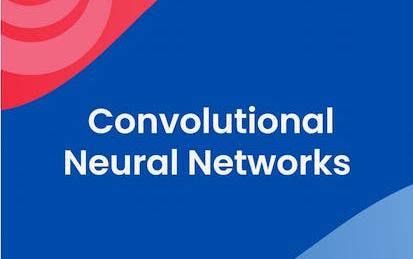
Natural Language Processing with Attention Models
In Course 4 of the Natural Language Processing Specialization, you will: a) Translate complete English sentences into Portuguese using an encoder-decoder attention model, b) Build a Transformer model to summarize text, c) Use T5 and BERT models to perform question-answering. By the end of this Specialization, you will have designed NLP applications that perform question-answering and sentiment analysis, and created tools to translate languages and summarize text! Learners should have a working knowledge of machine learning, intermediate Python including experience with a deep learning fra
-
Course by

-
 Self Paced
Self Paced
-
 35 hours
35 hours
-
 English
English
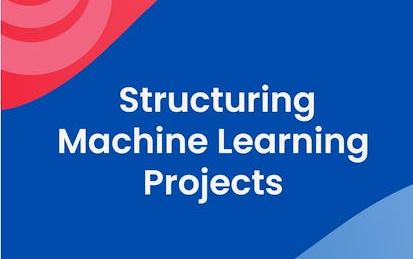
Data Pipelines with TensorFlow Data Services
Bringing a machine learning model into the real world involves a lot more than just modeling.
-
Course by

-
 Self Paced
Self Paced
-
 12 hours
12 hours
-
 English
English

Customising your models with TensorFlow 2
Welcome to this course on Customising your models with TensorFlow 2! In this course you will deepen your knowledge and skills with TensorFlow, in order to develop fully customised deep learning models and workflows for any application. You will use lower level APIs in TensorFlow to develop complex model architectures, fully customised layers, and a flexible data workflow.
-
Course by

-
 27 hours
27 hours
-
 English
English

Visual Perception for Self-Driving Cars
Welcome to Visual Perception for Self-Driving Cars, the third course in University of Toronto’s Self-Driving Cars Specialization. This course will introduce you to the main perception tasks in autonomous driving, static and dynamic object detection, and will survey common computer vision methods for robotic perception. By the end of this course, you will be able to work with the pinhole camera model, perform intrinsic and extrinsic camera calibration, detect, describe and match image features and design your own convolutional neural networks.
-
Course by

-
 31 hours
31 hours
-
 English
English

Probabilistic Deep Learning with TensorFlow 2
Welcome to this course on Probabilistic Deep Learning with TensorFlow! This course builds on the foundational concepts and skills for TensorFlow taught in the first two courses in this specialisation, and focuses on the probabilistic approach to deep learning. This is an increasingly important area of deep learning that aims to quantify the noise and uncertainty that is often present in real world datasets.
-
Course by

-
 Self Paced
Self Paced
-
 53 hours
53 hours
-
 English
English

Natural Language Processing with Classification and Vector Spaces
In Course 1 of the Natural Language Processing Specialization, you will: a) Perform sentiment analysis of tweets using logistic regression and then naïve Bayes, b) Use vector space models to discover relationships between words and use PCA to reduce the dimensionality of the vector space and visualize those relationships, and c) Write a simple English to French translation algorithm using pre-computed word embeddings and locality-sensitive hashing to relate words via approximate k-nearest neighbor search.
-
Course by

-
 Self Paced
Self Paced
-
 33 hours
33 hours
-
 English
English
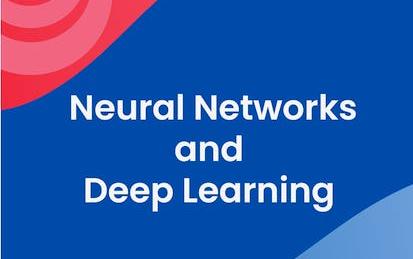
Introduction to TensorFlow for Artificial Intelligence, Machine Learning, and Deep Learning
If you are a software developer who wants to build scalable AI-powered algorithms, you need to understand how to use the tools to build them. This course is part of the DeepLearning.AI TensorFlow Developer Specialization and will teach you best practices for using TensorFlow, a popular open-source framework for machine learning. The Machine Learning course and Deep Learning Specialization from Andrew Ng teach the most important and foundational principles of Machine Learning and Deep Learning.
-
Course by

-
 Self Paced
Self Paced
-
 18 hours
18 hours
-
 English
English

Getting started with TensorFlow 2
Welcome to this course on Getting started with TensorFlow 2! In this course you will learn a complete end-to-end workflow for developing deep learning models with Tensorflow, from building, training, evaluating and predicting with models using the Sequential API, validating your models and including regularisation, implementing callbacks, and saving and loading models. You will put concepts that you learn about into practice straight away in practical, hands-on coding tutorials, which you will be guided through by a graduate teaching assistant.
-
Course by

-
 Self Paced
Self Paced
-
 26 hours
26 hours
-
 English
English

Natural Language Processing in TensorFlow
If you are a software developer who wants to build scalable AI-powered algorithms, you need to understand how to use the tools to build them. This Specialization will teach you best practices for using TensorFlow, a popular open-source framework for machine learning. In Course 3 of the DeepLearning.AI TensorFlow Developer Specialization, you will build natural language processing systems using TensorFlow. You will learn to process text, including tokenizing and representing sentences as vectors, so that they can be input to a neural network.
-
Course by

-
 Self Paced
Self Paced
-
 24 hours
24 hours
-
 English
English

Introduction to Machine Learning in Production
In the first course of Machine Learning Engineering for Production Specialization, you will identify the various components and design an ML production system end-to-end: project scoping, data needs, modeling strategies, and deployment constraints and requirements; and learn how to establish a model baseline, address concept drift, and prototype the process for developing, deploying, and continuously improving a productionized ML application.
-
Course by

-
 Self Paced
Self Paced
-
 12 hours
12 hours
-
 English
English

Improving Deep Neural Networks: Hyperparameter Tuning, Regularization and Optimization
In the second course of the Deep Learning Specialization, you will open the deep learning black box to understand the processes that drive performance and generate good results systematically.
-
Course by

-
 Self Paced
Self Paced
-
 24 hours
24 hours
-
 English
English
Sequences, Time Series and Prediction
If you are a software developer who wants to build scalable AI-powered algorithms, you need to understand how to use the tools to build them. This Specialization will teach you best practices for using TensorFlow, a popular open-source framework for machine learning. In this fourth course, you will learn how to build time series models in TensorFlow. You’ll first implement best practices to prepare time series data. You’ll also explore how RNNs and 1D ConvNets can be used for prediction.
-
Course by

-
 Self Paced
Self Paced
-
 23 hours
23 hours
-
 English
English

Convolutional Neural Networks in TensorFlow
If you are a software developer who wants to build scalable AI-powered algorithms, you need to understand how to use the tools to build them. This course is part of the DeepLearning.AI TensorFlow Developer Specialization and will teach you best practices for using TensorFlow, a popular open-source framework for machine learning. In Course 2 of the DeepLearning.AI TensorFlow Developer Specialization, you will learn advanced techniques to improve the computer vision model you built in Course 1.
-
Course by

-
 Self Paced
Self Paced
-
 17 hours
17 hours
-
 English
English
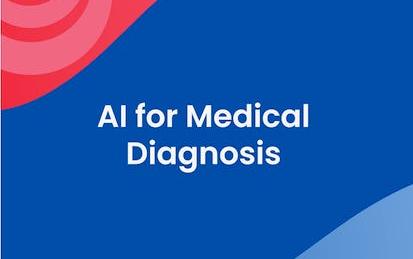
Neural Networks and Deep Learning
In the first course of the Deep Learning Specialization, you will study the foundational concept of neural networks and deep learning.
-
Course by

-
 Self Paced
Self Paced
-
 25 hours
25 hours
-
 English
English

Structuring Machine Learning Projects
In the third course of the Deep Learning Specialization, you will learn how to build a successful machine learning project and get to practice decision-making as a machine learning project leader.
-
Course by

-
 Self Paced
Self Paced
-
 7 hours
7 hours
-
 English
English

Natural Language Processing with Probabilistic Models
In Course 2 of the Natural Language Processing Specialization, you will: a) Create a simple auto-correct algorithm using minimum edit distance and dynamic programming, b) Apply the Viterbi Algorithm for part-of-speech (POS) tagging, which is vital for computational linguistics, c) Write a better auto-complete algorithm using an N-gram language model, and d) Write your own Word2Vec model that uses a neural network to compute word embeddings using a continuous bag-of-words model. By the end of this Specialization, you will have designed NLP applications that perform question-answering and se
-
Course by

-
 Self Paced
Self Paced
-
 31 hours
31 hours
-
 English
English
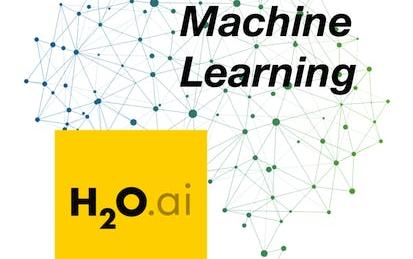
Practical Machine Learning on H2O
In this course, we will learn all the core techniques needed to make effective use of H2O. Even if you have no prior experience of machine learning, even if your math is weak, by the end of this course you will be able to make machine learning models using a variety of algorithms. We will be using linear models, random forest, GBMs and of course deep learning, as well as some unsupervised learning algorithms. You will also be able to evaluate your models and choose the best model to suit not just your data but the other business restraints you may be under.
-
Course by

-
 Self Paced
Self Paced
-
 24 hours
24 hours
-
 English
English

Natural Language Processing with Sequence Models
In Course 3 of the Natural Language Processing Specialization, you will: a) Train a neural network with word embeddings to perform sentiment analysis of tweets, b) Generate synthetic Shakespeare text using a Gated Recurrent Unit (GRU) language model, c) Train a recurrent neural network to perform named entity recognition (NER) using LSTMs with linear layers, and d) Use so-called ‘Siamese’ LSTM models to compare questions in a corpus and identify those that are worded differently but have the same meaning. By the end of this Specialization, you will have designed NLP applications that perfo
-
Course by

-
 Self Paced
Self Paced
-
 24 hours
24 hours
-
 English
English

Device-based Models with TensorFlow Lite
Bringing a machine learning model into the real world involves a lot more than just modeling. This Specialization will teach you how to navigate various deployment scenarios and use data more effectively to train your model. This second course teaches you how to run your machine learning models in mobile applications. You’ll learn how to prepare models for a lower-powered, battery-operated devices, then execute models on both Android and iOS platforms.
-
Course by

-
 Self Paced
Self Paced
-
 11 hours
11 hours
-
 English
English

AI for Medical Diagnosis
AI is transforming the practice of medicine. It’s helping doctors diagnose patients more accurately, make predictions about patients’ future health, and recommend better treatments. As an AI practitioner, you have the opportunity to join in this transformation of modern medicine. If you're already familiar with some of the math and coding behind AI algorithms, and are eager to develop your skills further to tackle challenges in the healthcare industry, then this specialization is for you. No prior medical expertise is required!
-
Course by

-
 Self Paced
Self Paced
-
 20 hours
20 hours
-
 English
English

Convolutional Neural Networks
In the fourth course of the Deep Learning Specialization, you will understand how computer vision has evolved and become familiar with its exciting applications such as autonomous driving, face recognition, reading radiology images, and more. By the end, you will be able to build a convolutional neural network, including recent variations such as residual networks; apply convolutional networks to visual detection and recognition tasks; and use neural style transfer to generate art and apply these algorithms to a variety of image, video, and other 2D or 3D data.
-
Course by

-
 Self Paced
Self Paced
-
 36 hours
36 hours
-
 English
English
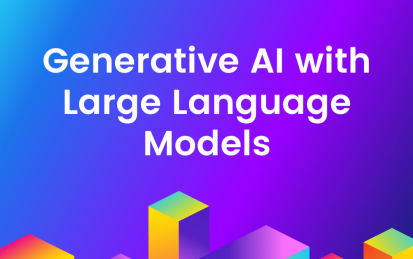
Generative AI with Large Language Models
In Generative AI with Large Language Models (LLMs), you’ll learn the fundamentals of how generative AI works, and how to deploy it in real-world applications. By taking this course, you'll learn to: - Deeply understand generative AI, describing the key steps in a typical LLM-based generative AI lifecycle, from data gathering and model selection, to performance evaluation and deployment - Describe in detail the transformer architecture that powers LLMs, how they’re trained, and how fine-tuning enables LLMs to be adapted to a variety of specific use cases - Use empirical scaling laws to optimiz
-
Course by

-
 Self Paced
Self Paced
-
 17 hours
17 hours
-
 English
English

An Introduction to Practical Deep Learning
This course provides an introduction to Deep Learning, a field that aims to harness the enormous amounts of data that we are surrounded by with artificial neural networks, allowing for the development of self-driving cars, speech interfaces, genomic sequence analysis and algorithmic trading. You will explore important concepts in Deep Learning, train deep networks using Intel Nervana Neon, apply Deep Learning to various applications and explore new and emerging Deep Learning topics.
-
Course by

-
 Self Paced
Self Paced
-
 17 hours
17 hours
-
 English
English



